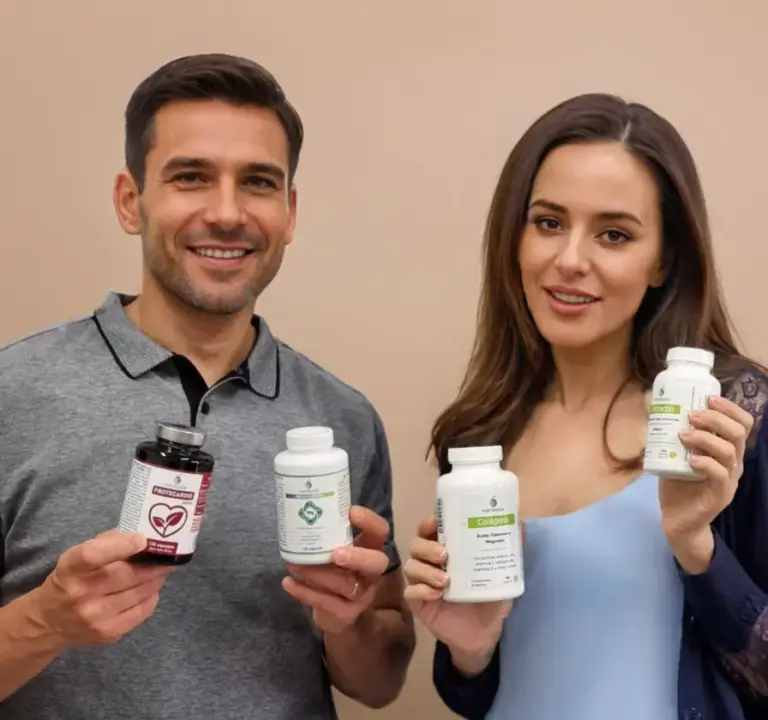ALPHA is a combination of Coenzyme Q10 with steroidal saponins, flavonoids, nitrates (sources of nitric oxide), terpenoids, and other natural polyphenols. Its ingredients have been studied for their roles in supporting libido, physical endurance, blood flow, and antioxidant activity.
Fenugreek
Fenugreek is a source of furostanol, a steroidal saponin. Scientific studies suggest it increases the production of the luteinizing hormone and dehydroepiandrosterone (DHEA), influencing testosterone levels and libido [1–4].
Other studies associate fenugreek with improvements in sugar metabolism and insulin resistance [5,6].
Ginkgo biloba
Ginkgo is rich in terpenoids and flavonoids. Studies suggest it improves blood circulation by increasing nitric oxide levels, a potent vasodilator [7]. Other studies indicate its flavonoids have neuroprotective and cardioprotective effects [7].
ALPHA uses a 50:1 Ginkgo leaf extract standardized to 24% flavonoid glycosides and 6% terpene lactones.
Tribulus terrestris extract
Tribulus terrestris contains steroidal saponins such as dioscin, protodioscin, and diosgenin. Some animal studies indicate that these compounds may increase libido and support free testosterone levels [8–11].
ALPHA uses a 25:1 extract with a minimum of 95% steroidal saponins.
Maca extract
Maca root has been studied for its effects on libido and semen quality [12–14]. Animal research has also linked maca to reduced prostate size [15]. The main bioactive components are lipid compounds, particularly macamides [16].
ALPHA uses a 10:1 maca root extract.
Avena sativa extract
Avena sativa contains phenolic alkaloids known as avenanthramides with antioxidant and anti-inflammatory properties [17]. It is also a source of avenacosides, which are steroidal saponins [18].
ALPHA uses a 10:1 extract of Avena sativa.
Coenzyme Q10
Coenzyme Q10 (Co-Q10), or ubiquinone, is an antioxidant found in mitochondria. Studies have shown that Co-Q10 supplementation may improve physical endurance and semen quality [19].
Black pepper extract
Black pepper contains piperine, a bioactive alkaloid with antioxidant and anti-inflammatory properties [20]. It is also a thermogenic compound that stimulates metabolism by acting on beta-receptors [21].
ALPHA uses a 35:1 black pepper extract with 95% piperine.
Garlic extract
Garlic contains alliin, which converts into allicin—a sulfur compound with several pharmacological properties. Animal studies suggest allicin may reduce atherosclerosis and fat deposits in arteries [22], and help regulate cortisol production [23,24]. Allicin is also known for its antioxidant and antimicrobial effects [25].
ALPHA uses a 50:1 garlic extract.
Watercress extract
Watercress is rich in nitrates, which are sources of nitric oxide—a vasodilator. Studies show watercress supplementation can help reduce exercise-induced oxidative stress [26,27].
ALPHA uses a 10:1 watercress extract.
References
Steels, E.; Rao, A.; Vitetta, L. Phytotherapy Research 2011, 25, 1294.
Wankhede, S.; Mohan, V.; Thakurdesai, P. Journal of Sport and Health Science 2016, 5, 176.
Aswar, U. et al. Phytotherapy Research 2010, 24, 1482.
Maheshwari, A. et al. International Journal of Medical Sciences 2017, 14, 58.
Sharma, R. D. Nutrition Research 1986, 6, 1353.
Xue, W. et al. Asia Pacific Journal of Clinical Nutrition 2007, 16 Suppl 1, 422.
Vale, F. B. C. et al. Gynecological Endocrinology 2018, 34, 442.
Chhatre, S. et al. Pharmacognosy Reviews 2014, 8, 45.
Neychev, V.; Mitev, V. Journal of Ethnopharmacology 2016, 179, 345.
Gauthaman, K. et al. Journal of Alternative and Complementary Medicine 2003, 9, 257.
Gonzales, G. F. et al. Asian Journal of Andrology 2001, 301.
Balick, M. J.; Lee, R. Alternative Therapies in Health and Medicine 2002, 8, 96.
Melnikovova, I. et al. Evidence-Based Complementary and Alternative Medicine 2015, 2015.
Gonzales, G. F. et al. Reproductive Biology and Endocrinology 2005, 3, 5.
Wu, H. et al. Bioorganic & Medicinal Chemistry 2013, 21, 5188.
Bratt, K. et al. Journal of Agricultural and Food Chemistry 2003, 51, 594.
Singh, R.; De, S.; Belkheir, A. Critical Reviews in Food Science and Nutrition 2013, 53, 126.
Kizaki, K. et al. Journal of Sports Medicine and Physical Fitness 2015, 55, 797.
Meghwal, M.; Goswami, T. K. Phytotherapy Research 2013, 27, 1121.
Nogara, L. et al. Proceedings of the National Academy of Sciences 2016, 113, 13009.
Eilat, S. et al. Coronary Artery Disease 1995, 6, 985.
Oi, Y. et al. The Journal of Nutrition 2001, 131, 2150.
Brownlee, K. K. et al. Journal of Sports Science & Medicine 2005, 4, 76.
Bayan, L.; Koulivand, P. H.; Gorji, A. Avicenna Journal of Phytomedicine 2014, 4, 1.
Meamarbashi, A.; Alipour, M. Avicenna Journal of Phytomedicine 2014, 4, 267.
Fogarty, M. C. et al. The British Journal of Nutrition 2013, 109, 293.
Start a one-month cycle and enjoy the benefits of ALPHA

















